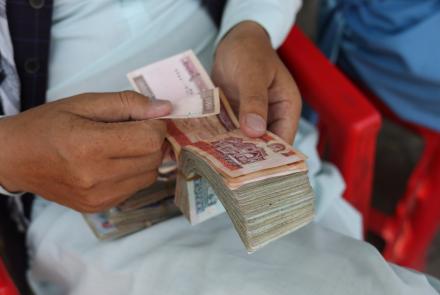Recently, the global World Food Organization revealed in its report that the stability of the Afghan currency began to take hold between January and March 2022 when UN cash shipments began, and the de facto authorities exerted strong controls on the illegal export of foreign currency, strengthening the Afghani. The report said, the Afghani strength against foreign currencies can be seen as a positive development for the economy, which helps stabilize prices and improves household purchasing power and cut high cost of living. According to the Afghan Central Bank, implementing some national and international stories, export development, prevention of extra expenses in government affairs, transparency, and implementation of monetary policies caused the stability of the Afghani currency against foreign banknotes.
Multiple surveys and reports by the World Bank, Afghan National Statistics and Information Society (NISA) as well as World Food Program revealed that the Afghan currency had got appreciation while year-on-year (y-o-y) headline inflation has de-accelerated during the first three quarters of the previous fiscal year, due a downward trend in fuel and commodity prices in the global market, a stable currency exchange rate and winter induced economic slowdown in the country. Similarly, reports suggest that Afghan currency significantly strengthened against the US dollar, Pakistan rupee, UK sterling, and Iranian Rial during the past months. Afghanistan’s exports had increased many folds that mostly comprise coal, food, and textile items shipped to neighboring Pakistan (60%), India (24), Iran, and Gulf nations. There had been a rise in Afghanistan’s imports during this period largely consisting of oil products, machinery, food, and textile items from Iran (22%), China (18%), Pakistan (17%)and UAE (12%) respectively.
The Republic of Afghanistan and its people had witnessed unprecedented destructions, miseries, and deprivations over the past four decades, while unceasing wars and civil insurgencies completely destroyed the essential road infrastructure, seriously undermined industrial growth, agriculture, and economic activities in the war-torn nation. At the same time, COVID-19 Pandemic, the global energy crisis, the war in Ukraine, natural disasters, and continuous droughts coupled with global economic and trade restrictions against the ruling Taliban regime pushed over one-third of Afghanistan’s population into a serious humanitarian crisis in the past year. Historically, Afghanistan mostly depends on foreign aid which constitutes about half of Afghanistan’s budget that had been stopped in the aftermath of the Taliban’s takeover of Afghanistan in late 2021. Despite all these challenges and handicaps, the Afghan economy has revived over the past year, Afghan currency got appreciation against its regional competitors and international currencies including the US dollar, Saudi Riyal, and UK Sterling, which is surely astonishing for the entire world while it is alarming and thoughtful for Pakistani leaders who sunk a growing economy through politicized policies and reckless decisions. As of yesterday, one Afghani was traded for 3.21 Pakistani rupees, and one US dollar had been bartered with 86 Afghani bank notes.
Currently, the Afghan interim government faces multiple legal, economic, and monetary challenges such as no diplomatic recognition, imposition of economic, trade, and travel sanctions, freezing of Afghan’s assets abroad, lack of financial resources, the nonexistence of a regular political setup, continued civil insurgency and terrorism, and a lingering humanitarian crisis, and irregular tax collection mechanism etc. However, an upward trend has been observed in economic indicators of the Afghan economy because of transparency, reduction in government expenditures, strict implementation of law, and accountability. Presently, there is utmost recognition across the border for the Taliban rulers, who performed unbelievably against corruption, poppy cultivation, and crimes, while putting the Afghan economy in an upward direction with sincerity and devotion. The Afghan interim government is eager to join China Pakistan Economic Corridor (CPEC), the construction of various multilateral energy and connectivity projects such as the TAPI gas pipeline, the CASA-1000 electricity transmission project, and the Uzbekistan-Afghanistan-Pakistan Railway project that will connect the Mazar-e-Sharif and Kabul with Pakistani port cities of Karachi and Gawadar.
Apparently, the Afghan economy will grow more rapidly if regional nations succeed in implementing those plans into reality, and the current diplomatic, political, and economic impediments remove in some time in future. Meanwhile, there are genuine concerns from the global community regarding the Taliban government’s policy on girls’ education and employment, human rights, absence of political inclusion, and terrorist safe havens, which are persistent challenges to Afghan peace, political stability, and economic revival. The Taliban government must work to bring back its people living refuge in other countries including Pakistan, Iran, and CARs because millions of Afghan refugees caused serious economic constraints, security issues, and social problems in the host nations. The interim rulers must lesson domestic and global voices against their controversial policies and review their course which will surely strengthen their rule, benefit the Aghan people and bring peace and prosperity to the country.
In fact, nations succeed with integrity, honesty, and hard work, while corruption, nepotism, and no implementation of the law had swamped the gigantic economies in the world. There is a great lesson for Afghanistan’s neighbors particularly Pakistan, which has turned into a paralyzed nation despite plenty of resources, vast infrastructure, fertile land, a solid industrial base, and a skilled workforce, only due to a lack of sincerity and dedication. Multiple events regularly happen around us that change peoples’ lives and turned course of history, if the nation and it’s leaders owe will to build their fate.







